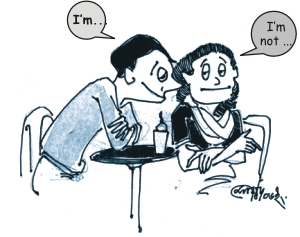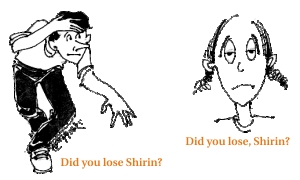| Reader's Club
Who's There?
Today let's discuss a typical feature of conversation i.e. the contraction. We often here people say, 'Who's there?', 'It's great!', 'That's not true.', or, 'I'm not coming this evening', 'I've an appointment with the doctor', 'I'll see you tomorrow', etc. But if our ear is not trained in the proper way, we might miss the contraction and there can be miscommunication. For example, suppose one says,
I'd like an ice-cream.
And the listener says, Oh, I like it too (because s/he has missed the 'would' in the contraction).

The response above is not the right one. One possible response could be,
What would you like to have, vanilla or chocolate?
Notice that there is a difference between I like ice-cream and I'd (I would) like an ice-cream.
The latter is a request and means I want an ice-cream, while the first one is a statement and expresses what the speaker likes.
A contraction is one word made out of two words. An apostrophe (') shows where a letter or letters have been left out. Thus, I'm = I am, you're = you are, he'll = he will,
she'd = she would, we've = we have, they'd = they had etc.
Many expressions that we use every day also contain contractions formed from verbs or modals plus the word not. For example,
I can't believe it! You don't mean it! It won't happen again. Haven't seen you for ages! Isn't it lovely? You aren't playing a trick on me, are you?
Notice that the contractions can't and won't are formed differently. When we add the words can + not, we drop the letters n and o and form the contraction can't.
The contraction for will + not is a new word altogether. Will + not becomes won't.
 Also note that you cannot (can't) form a contraction of the verb am plus not. For example, you don't say or write, I amn't(x) sure, or, I amn't(x) going to buy it. Also note that you cannot (can't) form a contraction of the verb am plus not. For example, you don't say or write, I amn't(x) sure, or, I amn't(x) going to buy it.
However, you can use a contraction in the above sentences in the following way:
I'm not sure. Or, I'm not going to buy it.
A common mistake that some students often make is in writing it's and its in appropriate places.
Always remember that it's the apostrophe (') that makes the difference in meaning in writing.
Look at the following sentences:
I've a cat. It's absolutely black, and its eyes are a blend of green and gray. Its name is Sundari.
Notice that it's (with the apostrophe in place of the dropped letter, i)) stands for it is, while the other two its are used to mean possession, i.e. the eyes of it and the name of it respectively.
Replace the underlined words in each sentence with a contraction and enjoy the riddles.
So, you are going to be a pilot.
Yes, I have high hopes.
Please tell me why you are standing on that new sidewalk.
We are cementing our friendship!
Oh, she is always changing her mind.
I hope someday she will find one she wants to keep.
He will always go to bed with his shoes on. Who is he?
He is a horse.
She would like to know why those hummingbirds are humming.
They are humming because they don't know the words.
Tell us where we will be
Able to hear the stars sing. You will be able to hear them sing in the opera house.
Are You Listening?
The language of conversation has some other characteristic features too. For example, in speaking, pronouncing the words correctly with the right sound and right stress is important. Imagine someone saying this, “I'm studying zoology.” If he or she doesn't pronounce the sound for 'z' correctly, the listener might misunderstand and think that the speaker is studying 'Geology.' Again, suppose you want to say,
“Look! He's going to sleep.”
But you pronounce the long vowel sound in “sleep” as a short one and end up saying,
“Look! He's going to slip.”
There is every possibility that the listener will get a different message from what you actually meant. Again, if we don't pronounce the sounds 'p' and 'f' correctly, for example in the following two sentences, we run the risk of being misunderstood. I want to buy two fans.
I want to buy two pans.
There are certain sounds, both consonants and vowels, in English which are not there in Bangla, and are therefore, difficult for us to say, for example, /f/ (as in fish), /v/ (as in very), /z/ (as in zoo), /s/ (as in song), or, the long /i:/ sound (as in feel, meal or beach), long /u:/ sound (as in pool), the long /a:/ sound (as in car, park), and a few other sounds. In order to be understood by others when we speak English, we need to learn and practise these sounds correctly.
This is not an impossible thing to do. However, it is not possible to teach these sounds through writing. We need to listen carefully and then produce the sounds correctly. We have plans to arrange workshops on these aspects of English at different Readers' Clubs across the country in near future.
Another typical feature of speaking is that we change or emphasize the meaning of what we say by the way we use our voice.
Read the pair of sentences below emphasizing the word in bold, and see how the meaning changes each time you say it.
Give me the paperback.
Give me the paper back.
In the first sentence you are asking your listener to give you the paperback edition of a book, not a hardbound copy. In the second one, you are asking the listener to return you the paper he has. This emphasis which we put on a particular word in a sentence, or a particular syllable off a word is known as stress. A sentence can have more than one meaning depending on which word we put the stress on.
Here are a few sentences for you to practise using stress.
Say each pair of sentences below. Emphasize the part in bold print.
Have you ever seen a horsefly?
Have you ever seen a horse fly?
Do you know who bought that green house?
Do you know who bought that greenhouse?
Have you ever seen a fire escape?
Have you ever seen a fire escape?
When we speak we emphasize words or parts of words, and we pause in certain places. In writing, we use the 'comma' to show where to pause.
Read each pair of sentences below and pause where there is a comma. Find out the different meanings of each pair of sentences.
Rana, my brother, is at work now.
Rana, my brother is at work now.
Munira, Ali, and Nikhil are discussing the new project.
Munira Ali and Nikhil are discussing the new project.
It's important to know and recognize these characteristic features of conversation such as, contraction, stress and pause, when we talk. They not only help make our speech sound natural, but failure to recognize them in conversation can often result in creating misunderstanding.
Exercise:
Try saying the sentence below in different ways by emphasizing (or putting stress on) different words at a time. Then describe 3 ideas or meanings you can bring out by changing the way you say it.
I am taking Bani to the theatre today.

Copyright
(R) thedailystar.net 2006 |
